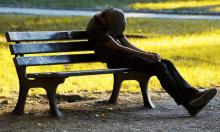collaboration


A few years ago, I was browsing a bookstore and wound up in the “Spirituality” section. While scanning the titles, I noticed something that struck me as ironic and funny.
At one end of a shelf was a book by an ardent and dogmatic atheist. At the other end of the same shelf was a book by an ardent and dogmatic fundamentalist.
Two books, same shelf.
And in many significant ways, two peas in the same pod, no?
The atheist and the fundamentalist needed each other as foils to sell their books and make a lot of money. They both had a vision of life that was black-and-white. Both thought they had infallible answers to life’s biggest questions.
Matching bookends indeed.
Don’t most of us live somewhere in-between?

I got a glimpse into the politics of scorn this week.
The visual was a photo accompanying a New York Times article on rental properties in Memphis, Tenn. The article itself seemed innocuous, about how foreclosed homes are being scooped up by outside investors and turned into rentals.
The photo, however, was troubling. It showed a young man lazing in a large chair while his two children stared numbly at a television screen and his wife tapped away on a cell phone.
I have no clue into this family’s character. But the visual screamed: “Idle! Lazy!”
FOR ANYONE who’s sick of explaining that not all evangelicals are flag-waving, Quran-burning, gay-hating, science-skeptic, anti-abortion ralliers, The Evangelicals You Don’t Know: Introducing the Next Generation of Christians provides a boost of encouragement. Written by frequent USA Todaycontributor Tom Krattenmaker, this who’s who of “new-paradigm evangelicals” explains how a growing movement of Jesus-followers are “pulling American evangelicalism out of its late 20th-century rut and turning it into the jaw-dropping, life-changing, world-altering force they believe it ought to be.”
Unlike their predecessors, these new evangelicals are characterized by a willingness to collaborate with members of other religions and no religion for the common good, warm acceptance of LGBTQ folks, a rejection of the dualistic pro-life vs. pro-choice debate, and a desire to participate in mainstream culture rather than wage war against it. All this “while lessening their devotion to Jesus by not a single jot or tittle.”
Admittedly, the book’s cover photo doesn’t quite do justice to Krattenmaker’s observations. Featuring young worshipers in a dark sanctuary with hands uplifted and eyes closed, each apparently lost in a private moment of four-chord progression praise, the cover looks more like a Hillsong worship concert circa 1998 than cutting-edge 2013 evangelicals. (If you’re unfamiliar with the four-chord progression, Google “how to write a worship song in five minutes or less.” You’re welcome.)
LIKE MANY Palestinians forced from their homes during the 1948 war, relatives of Jordan’s Sen. Haifa Najjar carried the keys to their Palestinian homes with them as they fled. These keys, passed down through generations, are powerful symbols of Palestinian ties to the land that international law considers theirs—even as their hope for return wanes.
As a Christian appointed by King Abdullah II to Jordan’s upper house of Parliament, Najjar is active in the education, environment, cultural, and legal sectors of the government. She is also superintendent of the Anglican-run Ahliyyah School for Girls and Bishop’s School for Boys in Amman, Jordan.
Within the mix of the 500,000 Palestinians who relocated to Jordan because of the Israeli War of Independence—or Nakba, “the catastrophe,” depending on who you ask—was a vocal minority of Palestinian Christians who joined their ranks with the existing Jordanian Christian community. Prior to 1948, Christians accounted for nearly 20 percent of the population of what is now Israel/Palestine. Today that figure is less than 2 percent. Even more dramatic are declines in the West Bank cities of Ramallah and Bethlehem. Christian populations are nearly extinct in these locations compared to their respective majorities of 90 and 80 percent prior to 1948.*
“They moved not as immigrants; they were initially thinking it was a temporary thing,” says Father Nabil Haddad of the Melkite Catholic Church in Amman. “It is similar to what Syrians are thinking right now when crossing the barbed wire, not the checkpoints, between south Syria and north Jordan.”